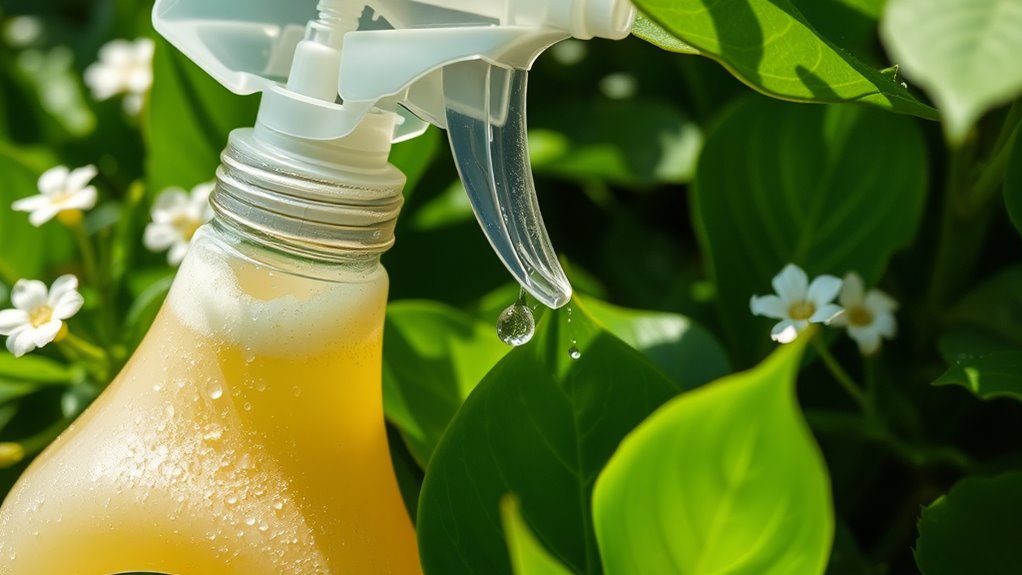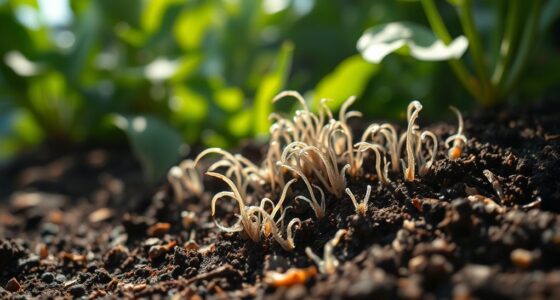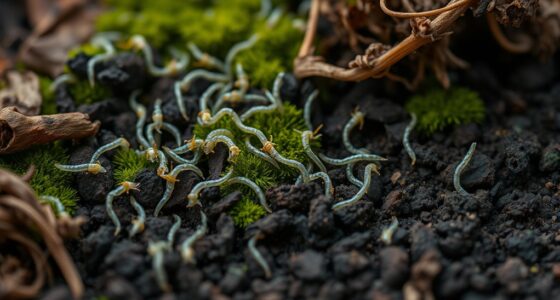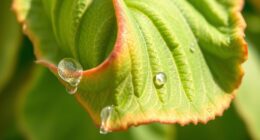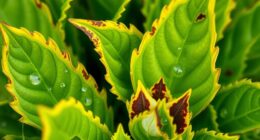To create a DIY natural insecticide using soap sprays, mix 1-2 tablespoons of mild liquid soap like castile soap with a gallon of water. Spray this solution thoroughly on affected plants, focusing on leaf undersides, and reapply every few days until pests decline. Soap sprays are eco-friendly, safe for beneficial insects, and effective against soft-bodied pests like aphids and spider mites. Keep exploring to discover tips for maximizing this simple, sustainable pest control method.
Key Takeaways
- Use mild liquid soap, like castile soap, mixed with water (1-2 tablespoons per gallon) for an effective DIY insecticide.
- Spray thoroughly on affected plants, focusing on leaf undersides, and reapply every few days for best results.
- Target soft-bodied pests such as aphids, spider mites, and whiteflies, which are more susceptible to soap sprays.
- Avoid over-concentrating the solution to prevent leaf damage; test on a small area first.
- Incorporate soap sprays into your organic gardening routine alongside beneficial insects and companion planting for enhanced pest control.
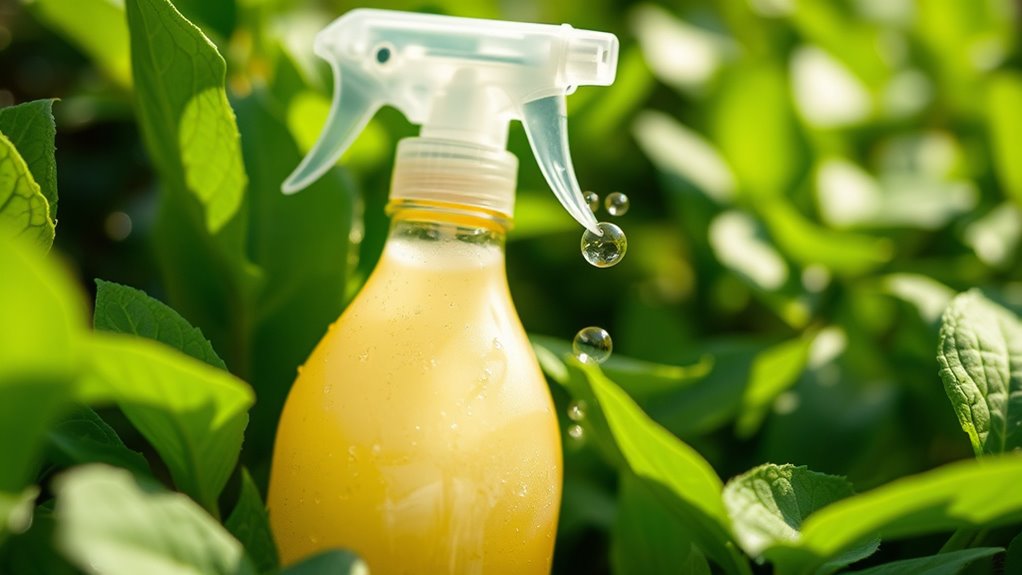
Have you ever wondered how soap sprays can make cleaning easier and more effective? If you’re looking for a natural way to protect your garden from pests, soap sprays are a simple yet powerful tool. They serve as a crucial part of your pest control strategies, especially if you’re committed to organic gardening techniques. Unlike chemical pesticides, soap sprays are gentle on beneficial insects, your plants, and the environment, making them an eco-friendly choice for maintaining a healthy garden.
Soap sprays offer a natural, eco-friendly way to protect your garden from pests.
When you incorporate soap sprays into your pest management plan, you gain a versatile method for dealing with common garden pests like aphids, spider mites, whiteflies, and mealybugs. These pests can quickly damage your plants, but a well-made soap spray can knock them back without the need for harsh chemicals. To prepare your own, you’ll need a mild liquid soap—preferably pure castile soap or a similar organic soap—and water. Mix one to two tablespoons of soap per gallon of water, then pour it into a spray bottle. Shake gently to combine, and you’re ready to apply.
Applying soap sprays is straightforward. Spray thoroughly on affected plants, focusing on the undersides of leaves where pests often hide. Reapply every few days until you see a decline in pest activity. Remember, consistency is key. One application might not be enough, but regular use will help you keep pest populations in check naturally. Keep in mind that soap sprays are most effective against soft-bodied insects, which are more susceptible to suffocation and dehydration caused by the soap solution. For tougher pests or heavily infested plants, you might need to combine soap sprays with other organic gardening techniques, like introducing beneficial insects or using companion planting to create an environment less attractive to pests.
The beauty of soap sprays lies in their safety and simplicity. They fit seamlessly into your organic gardening techniques, helping you avoid synthetic pesticides while still maintaining an effective pest control strategy. Plus, homemade soap sprays are cost-effective and customizable. You can adjust the soap concentration or add natural ingredients like neem oil or garlic extract to boost their effectiveness. Just be cautious not to overuse, as too concentrated solutions can cause leaf damage or stress your plants.
Incorporating soap sprays into your garden routine empowers you to take control of pest management naturally. They’re easy to prepare, safe for your plants and the environment, and an essential part of a holistic organic gardening approach. When you understand how to use them properly, soap sprays become a reliable, eco-friendly tool that helps your garden thrive without relying on harmful chemicals. Additionally, understanding the benefits of organic gardening techniques can enhance your pest management strategies further, leading to a healthier and more sustainable garden.
Frequently Asked Questions
Can Soap Sprays Harm Beneficial Insects in My Garden?
You might wonder if soap sprays harm beneficial insects. Generally, they mainly target soft-bodied pests, but there can be non-target effects if applied excessively or during peak activity times. To protect beneficial insects, apply soap sprays early in the morning or late in the evening, and avoid spraying blooms. This approach minimizes harm to beneficial insects while effectively managing pest populations in your garden.
How Long Does a Homemade Soap Spray Last Once Prepared?
Think of your homemade soap spray as a delicate flower — it needs proper care to stay fresh. Typically, its storage duration or shelf life is about one to two weeks if kept in a cool, dark place. To guarantee effectiveness, it’s best to make small batches and use them quickly. Always check for signs of spoilage, like an off smell or change in appearance, before applying.
Are There Specific Soap Types Best for Insect Control?
You should choose soaps with a high fatty acid content, like pure castile or biodegradable soaps, for effective insect control. Avoid commercial formulations with added dyes or fragrances, as they can harm plants. Use a proper soap concentration, typically 1-2%, to guarantee effectiveness without damaging leaves. These specific soap types are gentle yet potent, making them ideal for natural pest management in your garden.
Can Soap Sprays Be Used on Edible Plants Safely?
You might worry about using soap sprays on edible plants, but they’re generally safe when you follow soap spray guidelines. Just choose gentle, plant-safe soaps and dilute them properly to avoid damaging your crops. Always rinse your plants before harvesting to confirm any residue is removed. As long as you stick to recommended concentrations, soap sprays are an effective, eco-friendly way to control pests without compromising edible plant safety.
How Often Should I Apply Soap Sprays for Effective Pest Control?
You should apply soap sprays every 5 to 7 days for effective pest control. This application frequency helps prevent pest resurgence and keeps bugs at bay. Be sure to monitor your plants regularly, and if you notice pests returning sooner, increase the frequency slightly. Consistent use guarantees pests don’t develop resistance and your plants stay healthy. Always follow the instructions and avoid over-application to protect your edible plants.
Conclusion
Ready to give soap sprays a try? They’re an easy, natural way to protect your garden without harsh chemicals. With simple ingredients and straightforward application, you can keep pests at bay and support healthy plants. Isn’t it worth trying a gentle, eco-friendly solution before reaching for toxic sprays? Your garden will thank you for choosing a safer, sustainable approach to pest control. So, why not start today and see the difference it makes?
